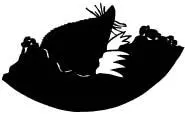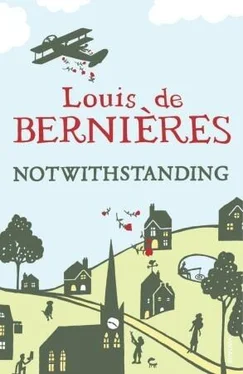Louis de Bernieres - Notwithstanding - Stories from an English Village
Здесь есть возможность читать онлайн «Louis de Bernieres - Notwithstanding - Stories from an English Village» весь текст электронной книги совершенно бесплатно (целиком полную версию без сокращений). В некоторых случаях можно слушать аудио, скачать через торрент в формате fb2 и присутствует краткое содержание. Год выпуска: 2010, Издательство: Vintage, Жанр: Современная проза, на английском языке. Описание произведения, (предисловие) а так же отзывы посетителей доступны на портале библиотеки ЛибКат.
- Название:Notwithstanding: Stories from an English Village
- Автор:
- Издательство:Vintage
- Жанр:
- Год:2010
- ISBN:нет данных
- Рейтинг книги:4 / 5. Голосов: 1
-
Избранное:Добавить в избранное
- Отзывы:
-
Ваша оценка:
- 80
- 1
- 2
- 3
- 4
- 5
Notwithstanding: Stories from an English Village: краткое содержание, описание и аннотация
Предлагаем к чтению аннотацию, описание, краткое содержание или предисловие (зависит от того, что написал сам автор книги «Notwithstanding: Stories from an English Village»). Если вы не нашли необходимую информацию о книге — напишите в комментариях, мы постараемся отыскать её.
is a funny and moving depiction of a charming vanished England.
Notwithstanding: Stories from an English Village — читать онлайн бесплатно полную книгу (весь текст) целиком
Ниже представлен текст книги, разбитый по страницам. Система сохранения места последней прочитанной страницы, позволяет с удобством читать онлайн бесплатно книгу «Notwithstanding: Stories from an English Village», без необходимости каждый раз заново искать на чём Вы остановились. Поставьте закладку, и сможете в любой момент перейти на страницу, на которой закончили чтение.
Интервал:
Закладка:
In the morning Lizzie is in good spirits, and accepts gifts of grapes and cheese, but it is some weeks before she resumes the mischievous and violent pecking which is her main enjoyment in life. Robert worries for ages that when Mr Lakin’s bill arrives, he might not have enough pocket money to pay for it, but no bill ever does. Mr Lakin has several pro bono cases a year of little boys with accident-prone pet corvids, often including incidents with rat traps, and in any case he doesn’t charge for advice.
Lizzie reaches sexual maturity, and the lovable feathers at the base of her beak fall out in manifestation of it. Her violet eyes fade. She looks a lot less pretty now that she is a full-grown rook, but her feathers are glossy and iridescent. She has taught herself how to ant, utilising the ants that live in the crevices of the crazy paving, and two or three times a day she bathes joyously in a bucket that has been left to catch the overflow of one of the gutters. She stands on the edge of the bucket, and then hops in, splashing with delight. She hops out, shakes herself, and then skips back in again. Visitors watch her with pleasure sparkling in their eyes, and they say to Robert, ‘Whoever would have guessed that a bird could be so much fun?’ and ‘When you grow up I expect you’ll be a vet.’
It is autumn, and Uncle Dick warns Robert that soon Lizzie will leave home and go to find some rooks to live with. That’s what they always do, they can’t help it, that’s nature for you, it doesn’t mean that they don’t love you. Lizzie goes for walks with Robert and he holds her on his wrist and reaches up into elder bushes so that she can devour the berries. She loves them so much that she yells with pleasure in between each beakful. The lilac excrement that ensues is so acid that it removes patches of black paint from Uncle Dick’s Ford Prefect.
Every evening Lizzie meets Robert at the bus stop when he comes back from school. The moment that he gets off at Lane End, she lands on his shoulder and murmurs hoarse endearments as she rearranges the hair about his ears. The boys are envious because he seems like a wizard, and the girls are fascinated and repelled. Lizzie stabs anyone who reaches up a finger to pet her, and she is particularly infuriated by fingers that wear rings. Robert feels set apart, privileged, because he has a bird that meets him at the bus stop and comes home with him on his shoulder, even if occasionally she flies away and back again when their progress seems too slow.
It is autumn, and then winter, and Lizzie has still not left home. She sleeps in the lilac bush, her head under her wing, her feathers dusted with frost, and every day she follows her routine, confounded only by the ice on her bucket, which Robert has to remove so that she can bathe. He is astounded by her immunity to cold and high winds. Uncle Dick professes astonishment that Lizzie is still there, he says that he has never before heard of a rook that stayed after autumn, and neither has anyone else, and he is still determined that one day she will learn to say ‘silly bugger’. He says it to her repeatedly, and she just ruffles her feathers and replies ‘Come on’ in Robert’s voice.
The following spring Lizzie starts turning up with another rook, who remains at a sensible distance while she receives her grapes and cheese, or accompanies Robert home from school. Robert is glad that she has found a friend, but worries that he will take her away.
There is no sign of this, however, and she is her usual ebullient and affectionate self, until, suddenly, she has gone altogether.
There has been no slow detachment, no gradual growing apart, no chance to become reconciled or resigned, no chance of farewell. The little shelter in the lilac is deserted, the bucket is disused, there is no more need to buy a bunch of grapes every week. Now they won’t need so much Cheddar either.
Robert and Uncle Dick sit side by side on the doorstep at the weekend, and Uncle Dick says, ‘Well, I did warn you, son. They’re like women, they always bugger off sooner or later. Don’t matter how nice you are.’
Robert doesn’t believe him. He thinks that the bond between them was something special, that Lizzie wouldn’t just disappear all of a sudden. Even so, he can see that Uncle Dick is right. She probably went away with her friend to make eggs. That’s what Uncle Dick says. ‘It’s the call of the wild, son.’
Uncle Dick puts his hand on Robert’s shoulder as he stands up. ‘Sorry, son,’ he says, and as he walks away he adds, ‘Did I tell you, son? Couple of days ago I thought I heard her say “silly bugger”. I wasn’t sure, though.’
Robert goes up the lane and turns right into the woods behind the Institute of Oceanography. By the pink water tower he stands under the elms and looks up at the rooks. They are squabbling over nest sites, and repairing old ones. He sits on a stump amid the ferns of bracken until dark, convinced that Lizzie couldn’t be up there making eggs. He would recognise her voice if she was there, and in any case she would come down the moment she knew he was there. He sits there until dark. He thinks of what Uncle Dick says about women. ‘You can find a really special one, son, and then she goes and breaks your heart, and then one day you realise that you’re glad you had her, and all right, you’ll miss her for ever, but that’s that. You don’t have to grieve no more.’
Robert listens to the sleepy noises of the rooks above him in the dark, and because there is no one there except the birds, he allows himself to cry silently for a while. Eventually, when the cold sets in and the dew starts to settle, he stands up stiffly, rubs his eyes on his sleeve and starts for home. Once again, spring is about to hurl new life into the world, and soon there will be new birds to look after in his garden hospital. No doubt it will never be the same again, but, as Uncle Dick says, ‘You carry on, son. You got your memories, so that’s what you do. Life’s a bugger, but you look straight ahead, and you bleedin’ well carry on.’
SILLY BUGGER (2)

ROYSTON CHITTOCK WAS bought out by his partners for quite a handsome sum. They had been saying flattering things to him, such as ‘You’ve put so much into the business, old boy, isn’t it time you had some life for yourself?’ and ‘You deserve a rest, old boy, all work and no play, and so forth.’ But really it was because they could not bear to work with him any more. He was the kind of colleague who gets bees in his bonnet. He would become obsessed by trivial matters, and it had become worse and worse as time went by. Finally they had decided to try and buy him out after he had spent six months worrying aloud about whether or not the banisters on the staircase up to the office were the right height. He was getting the secretaries to walk up-and downstairs several times a day, in order to compare their opinions. He was asking clients about it instead of discussing business, and he was taking up far too much time on the topic at meetings. His previous obsession had been to do with the properties of manila envelopes, and before that he had been worrying about the likelihood of an airliner falling on the office while on the way to Heathrow.
Blessed with a huge lump sum, and the relieved good wishes of his former colleagues, Royston Chittock sold his house in Dover House Road, Putney, and moved southwards down the A3 to Notwithstanding, a village where he knew nobody, and with which he had no prior connection. It was a short train journey from there to London, a fact which was of value to him because, like anyone who has been a Londoner for any length of time, he was profoundly attached to the delusion that London is the centre of the universe. He found a modest house near the sign which said ‘Best Kept Village 1953’ and planned to spend a long and comfortable retirement golfing, gardening, and collecting and dealing in stamps. There was very little that he didn’t know about the philately of Japan and the former colonies. It was an ill-omened time to move. The evening after his arrival, the Horse and Groom and the Seven Stars in Guildford were blown up, killing five youngsters and injuring sixty-five.
Читать дальшеИнтервал:
Закладка:
Похожие книги на «Notwithstanding: Stories from an English Village»
Представляем Вашему вниманию похожие книги на «Notwithstanding: Stories from an English Village» списком для выбора. Мы отобрали схожую по названию и смыслу литературу в надежде предоставить читателям больше вариантов отыскать новые, интересные, ещё непрочитанные произведения.
Обсуждение, отзывы о книге «Notwithstanding: Stories from an English Village» и просто собственные мнения читателей. Оставьте ваши комментарии, напишите, что Вы думаете о произведении, его смысле или главных героях. Укажите что конкретно понравилось, а что нет, и почему Вы так считаете.












